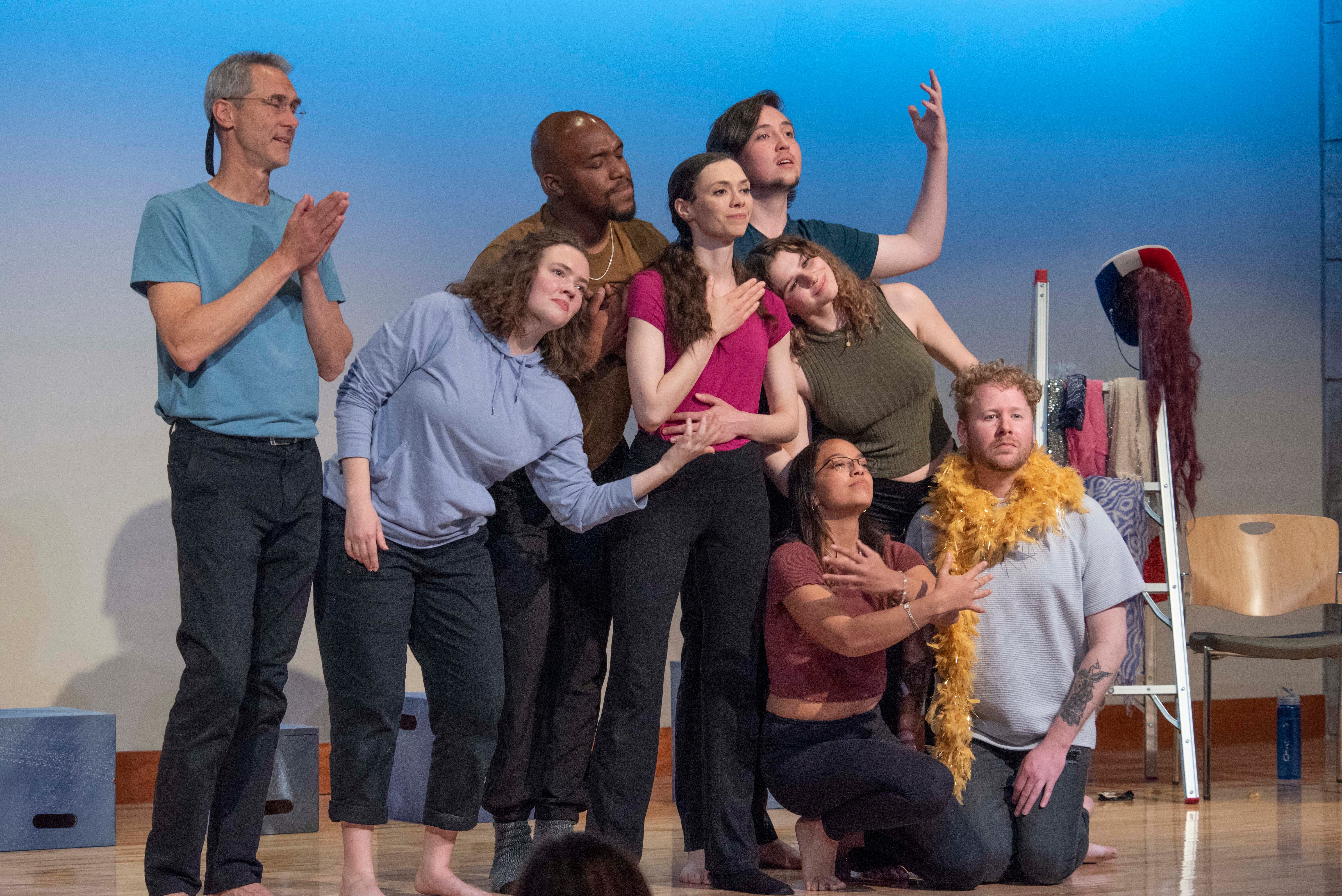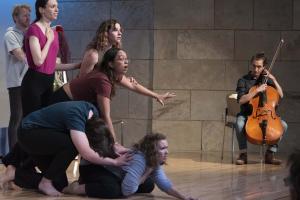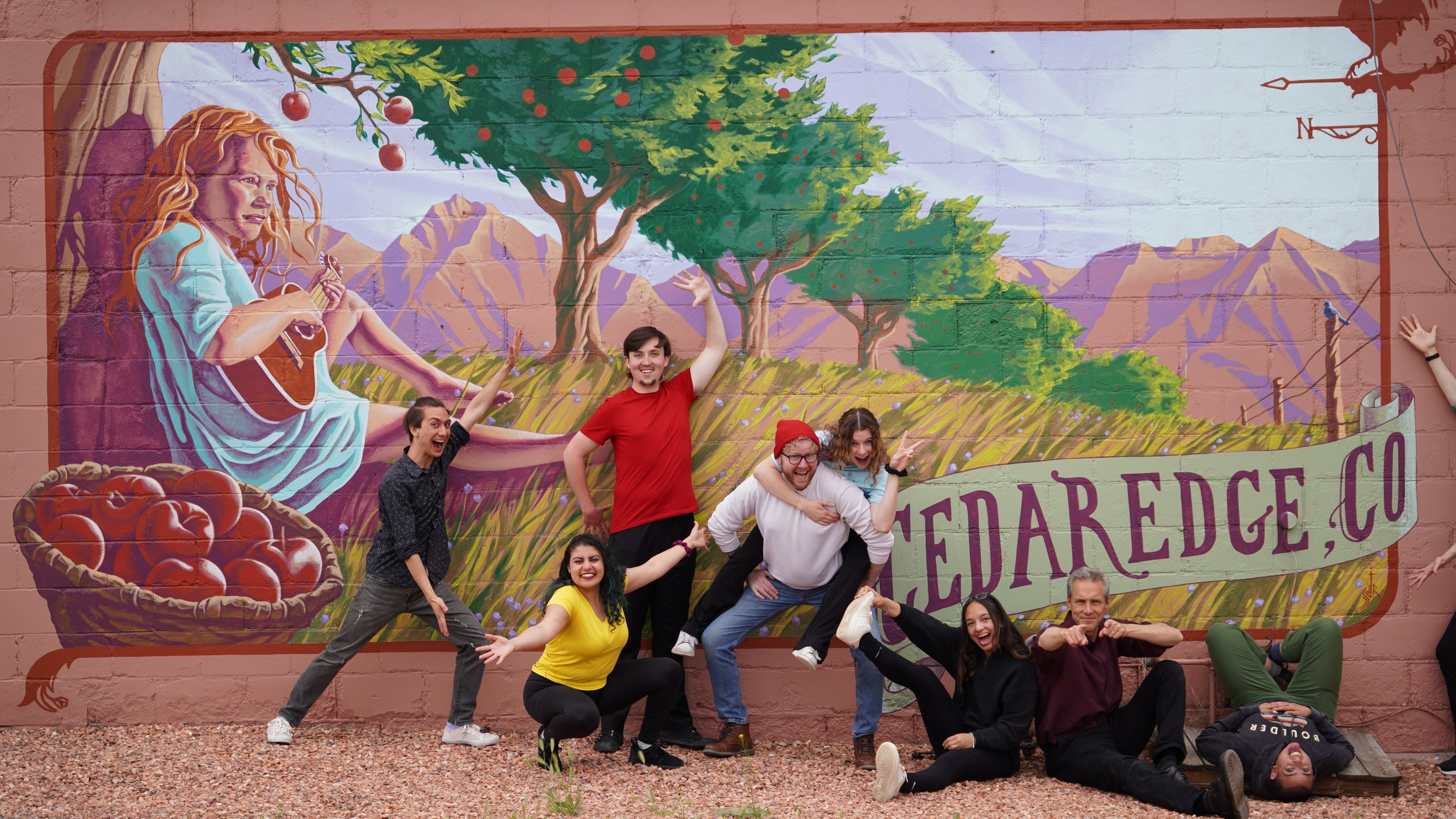Acting out to help communities see within

A troupe of actors from CU Boulder makes a habit of appearing in front of audiences across the state without a script in sight, without a clear idea of what they might be saying or doing. Yet the artists are well-prepared to achieve a performance that goes beyond ordinary entertainment.
CU Boulder’s Impact Playback Ensemble practices what’s known as playback theater – an interactive, improvisational form of theater that begins with members of an audience telling stories from their lives. Actors then bring these stories to life on stage, aiding in the sharing of insight and community building that might not otherwise come about.
Jim Walker, Norlin Scholars Teaching Associate Professor and director of the Playback Ensemble, has practiced playback theater professionally since 2006, and helped launch CU Boulder’s troupe in 2018. In performances, workshops and residencies, the experience begins with the “teller,” the audience member sharing an aspect of their life.
“Playback promotes listening as a whole-body activity,” Walker said. “As a Playback actor, you are 100% engaged when listening to a teller’s story. They might laugh their way through a fairly traumatic story. So it sounds like a funny story…but is it? Is that laughter a coping mechanism?
“It engages so many parts of myself. And it’s community building.”
Upon hearing the story, Playback actors and musicians improvise a theatrical response to whatever is shared.
“The guiding principle of Playback Theater is to honor the teller,” Walker said. “That’s the spirit in which we’re doing this. By honoring the teller’s experience, people find connections and insight.”
As an audience member, Walker said, “When I’m witnessing a good Playback, I’m seeing part of my own story in the story being shared. I’m discovering insights about my experience while finding myself in the other.”
CU Boulder’s Playback Ensemble performs at a variety of campus and community events, including individual classes. A grant last year from the President’s Fund for the Humanities helped make possible performances in support of the Boulder JCC, Donna Mejia’s Fumble Forward Initiative, and the College of Engineering’s Academic Success team.
“The nice thing about Playback is that it’s really malleable to the needs or requests of whatever the group might be,” Walker said. “There’s no agenda; it’s just a modality that has proven to bring people together.”
Another key aspect of the Playback Ensemble’s mission plays out in rural communities across Colorado. The Critical Conversations project visits areas where rapid changes may have brought about cultural divides and tensions between community members. Residents of Paonia were first to approach the theater program, asking about ways to address those struggles. It led to the department’s Ondine Geary securing a CU Outreach and Engagement grant, which enabled a four-day residency just before the COVID lockdown.
“We had listening sessions with representatives of different parts of the community: old-timers, business owners, ranchers, self-described hippies,” Walker said. “It was such a success, we have returned there every year since 2020. Each time we go, we’ve expanded a little further.”
The list of towns where Playback has visited now includes Hotchkiss and Cedaredge. A collaboration with the Smithsonian Institution helped add visits to Walsenburg and Trinidad.
Through the theatrical interactions, Playback’s presence is helping to promote listening as a practice of democracy, Walker said.
“As a social body, we clearly need this right now,” he said. “After one of our recent residencies, a community partner said how refreshing it was to have people in the room sharing and listening, not yelling and throwing chairs.
“Witnessing a Playback performance offers opportunities for boosting empathy and connection across differences. These are skills that can be developed. They are needed. And they can be fun.”
Though based in the Department of Theatre & Dance, CU’s Playback Ensemble includes faculty, staff, graduate and undergraduate students from several departments.

Tania Guzman, an undergraduate majoring in integrative physiology, found Playback via a leadership course assignment. With no theater background, she believed the experience would push her out of her comfort zone. She met with Walker shortly after completing her EMT training.
“Surprisingly, I found parallels between my EMT experience and CU Playback, particularly in the aspect of improvisation,” Guzman said. “The prospect of using improvisation to initiate conversations and connect with communities intrigued me.
“Being a part of CU Playback has brought immense joy to my life. I’ve acquired valuable skills in understanding diverse emotions. A standout memory for me was the first time I was cast as the teller’s actor. Portraying someone I’ve known for three years while hearing their story in a new setting was a unique experience.”
She calls her participation in Playback a “profoundly humanizing experience.”
“Allowing individuals to share their stories in front of an audience helps forge connections and uncover shared experiences,” Guzman said.
Unlike Guzman, Franklin Chilaka, a Ph.D. candidate in the School of Education, always wanted to be an actor.
“What I love about Playback is the body high I get from it and being able to tell stories with our bodies,” Chilaka said. “We get to tell real stories about resilience, fear, strength and love, to name a few, that speak to our true existence as human beings. It allows our audience to fully engage with our work and not just be passengers in a larger experience.”
The troupe numbers around 10 members, with new participants joining on a rolling basis. Anyone who’s interested in taking part and would like to learn more can visit the website or contact Walker: James.F.Walker@colorado.edu.


